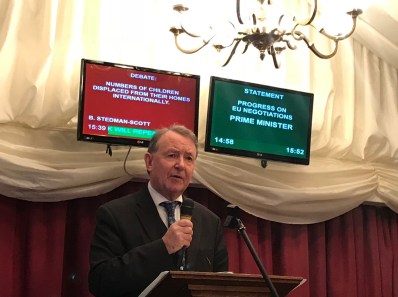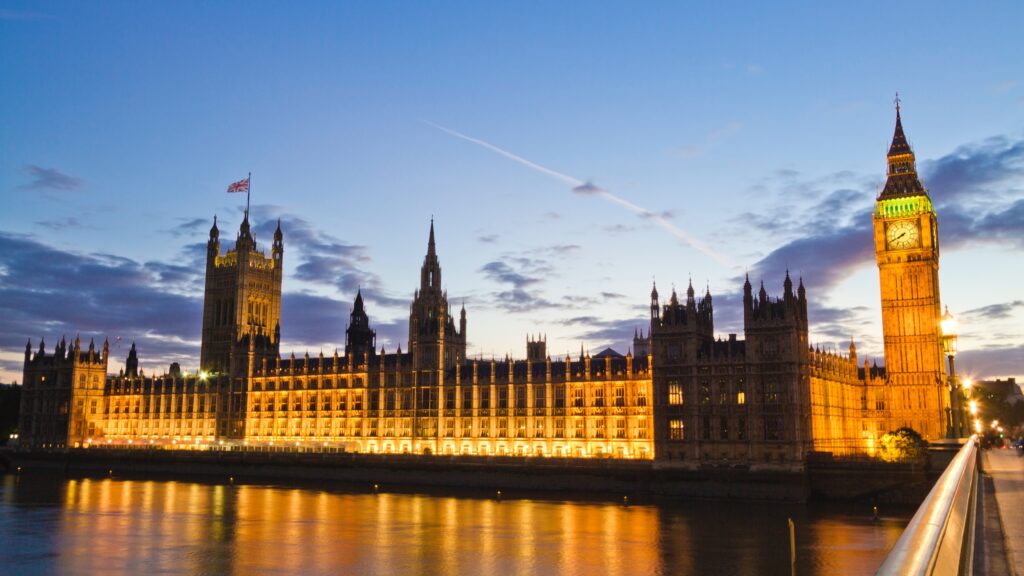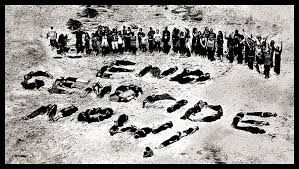
In A Third Vote, The House of Lords Again Passes The All Party Genocide Amendment by a Majority of 153 (367 votes to 214). Now it is up to the House of Commons to act.
Constituents are urged to contact their MPs before the next vote in the House of Commons.
Lord Alton of Liverpool (CB)Sharethis specific contribution
My Lords, in declaring my non-financial interests as listed in the register, and turning to Motion B1 and Amendment 3E in lieu, I give notice of my intention to seek the opinion of the House when the time comes. The arguments in favour of the all-party genocide amendment have been extensively aired in Committee, on Report, and in deciding to send the amendment back to the House of Commons, so I will not rehearse again all the arguments about the total inadequacy of our response to genocide, but simply set out why this proposition should be sent back to another place with the strongest possible message that this House will not remain indifferent or silent in the face of the very worst atrocity crimes, and nor will your Lordships be satisfied with a sleight of hand.2.15pm
In addressing us, the Minister said three things that I will immediately address. First, he said that this would change our constitutional approach by the back door. It is not changing our constitutional approach, for reasons I will give, and certainly not by the back door: we are debating an amendment on the Marshalled List. Secondly, he said that it would blur the distinction and challenge the separation of powers. It would do neither of those things, for reasons I will come to. Thirdly, he said that it is a determination that can be made only by a court of law, and then said that the Government are opposed to providing the opportunity by empowering a court of law—the High Court in this country—to make such a determination. The Government are tying themselves in knots; I will explore some of those knots.
Our amendment would merely insert a committee of legal experts into the proposal sent here by the elected Chamber. It cannot be unfettered and unaffected by other considerations. I say to the Minister that I too am a free trader, who calls in his defence Richard Cobden, the greatest advocate of free trade, but who said that two of the greatest evils of his day—the transatlantic slave trade and the opium trade in China—were unconscionable evils that overrode the creed of free trade. It is not difficult to imagine what his response would be today if he were confronted with what is happening to the Uighur Muslims. The Foreign Secretary, Dominic Raab, yesterday described their suffering to the United Nations Human Rights Council:
“The situation in Xinjiang is beyond the pale. The reported abuses—which include torture, forced labour and forced sterilisation of women—are extreme and they are extensive. They are taking place on an industrial scale.”
On the very pertinent issue of trade, the Foreign Secretary said that
“no company profiting from forced labour in Xinjiang can do business in the UK”
and that he will ensure
“that no UK businesses are involved in their supply chains.”
In line with this, the Government have repeatedly told the House that they are not seeking a free trade agreement with China. But this is not the whole story, and we must be wary of falling for the stage magic of rabbits and empty hats.
We need to focus on a reported meeting in Downing Street on 12 February because of what it reveals, not on an illusion. On one hand the Foreign Secretary rightly sets out his strong message and Ministers opposed to this amendment reassuringly tell Parliament that there is no imminent prospect of the United Kingdom signing any new trade or economic agreements with China. They tell us to trust them and that if there were any evidence of serious human rights abuses they would themselves baulk at signing such agreements, thus making the amendment otiose. Indeed, it was the Minister who told us, in terms, in our previous debate:
“Any responsible Government, and certainly this one, would have acted well before then.”—[Official Report, 2/2/21; col. 2082.]
However, in the same week, the Minister answered a PQ on trade with China saying that
“we are pursuing increased bilateral trade.”
This is to be seen in the context of a 100-page legal opinion by Alison Macdonald QC, a leading barrister, that there were strong legal grounds to conclude that crimes against humanity and genocide are being perpetrated by the Chinese state.
Yet last week the Prime Minister held a round table with companies trading with China, such as Swire Group and Tenacity, and is reported as saying that, despite occasional political differences, he wants a resumption of formal trade discussions with China, reactivating two forums, the Economic and Financial Dialogue and the China-UK Joint Economic and Trade Commission—JETCO—which had both been suspended in response to China’s repression of civil rights in Hong Kong. Meanwhile, the situation in Hong Kong continues to worsen, while atrocities in Xinjiang, as the Foreign Secretary said yesterday, are on “an industrial scale”. This, too, has to be seen in the context of the Biden Administration naming events in Xinjiang a genocide and criticising the European Union for pressing ahead with a massive investment deal with China. Only last night, the Canadian Parliament voted 266 to zero to recognise the Uighur genocide.
In 1941, in a live broadcast from London, Winston Churchill said that the systematic slaughter of six million people was
“a crime without a name”.
In 1948, Raphael Lemkin gave it a name and crafted the genocide convention, with duties that we are required to affirm. It is an international treaty. Lemkin expected the word to be matched by deeds, but it never has been. We fail to predict genocide. We fail to prevent genocide, to protect victims of genocide and to prosecute perpetrators of genocide. The genocide amendment is a modest attempt to address some of those failings. The very welcome election last week of the British QC, Karim Khan, as the new chief prosecutor of the International Criminal Court may be another harbinger of change.
This brings us back to today. We are well within our constitutional rights to ask the House of Commons to think further about this. On Report, the House unequivocally passed this all-party amendment by a majority of 126. It failed in the Commons by a slender margin of 11. On its return to the Lords we passed it by an even bigger majority of 171, with 359 votes to 188. It secured those votes thanks to the strong bipartisan support of Back-Bench Members and Opposition Front-Bench spokesmen, notably the noble Lords, Lord Stevenson of Balmacara, Lord Collins of Highbury and Lord Purvis of Tweed, and from the government Benches the noble Lords, Lord Blencathra, Lord Cormack, Lord Polak and many others. There were also the sponsors of the amendment: the noble Lords, Lord Forsyth and Lord Adonis, the noble Baroness, Lady Kennedy of The Shaws, and, at an earlier stage, my noble friend Lady Falkner of Margravine.
Unfortunately, in a procedure heavily criticised by Sir Iain Duncan Smith, the former leader of the Conservative Party, the opposition Front Bench and Members from all parties in the Commons, they were denied a separate vote on the genocide amendment. I say to the Minister that after 40 years of serving in both Houses, I am well aware of the precedents, but I am also well aware that business managers can use the Order Paper to their advantage and to frustrate Parliament when they wish to do so.
Instead, a government-inspired amendment was passed, simply enabling Select Committees of either House to consider whether a genocide is under way in a particular jurisdiction. It does not require an Act of Parliament to enable that. It is hardly what the Minister described as a middle way. This is a power which Select Committees already enjoy; it does nothing to break the current policy conundrum whereby the Government maintain that genocide is, as we have heard repeated in your Lordships’ House, a matter for “judges, not politicians”, while knowing that there is no prospect of any judge hearing the case, owing to the ability of certain states to frustrate the international judicial system.
As recently as this morning, the Minister’s department told the BBC that it will continue to argue that genocide determination is only for the courts, but now the Government say that they will allow a Select Committee to take a view. What is it supposed to take a view on? It is surely on whether the committee believes a genocide is taking place, but that will not be taken as a determination. A former Minister told me that the argument that this must be decided by the courts, knowing that there is not one empowered in the United Kingdom to resolve it, had become an unsustainable embarrassment, with Ministers expected implausibly to repeat the argument ad nauseum in the face of unfolding atrocities.
We now have a situation where the Government are asking Select Committees to do something that they believe is impossible, and which the Government have no intention of taking any notice of. This is just as in 2016, when the Commons passed a Motion saying that a genocide was under way against the Yazidi and other minorities in northern Iraq. The Government said it had no status to do that—and that was on the Floor of the House of Commons, not just in a Select Committee. It will require all the powers of a stage magician to untie the knots with which the Government’s contradictory arguments have become entangled.
The amendment has two further serious defects. First, it applies only to prospective free trade agreement counter-signatories, which excludes China, and therefore, as the Government well know, would do nothing to help Uighurs. Secondly, the government-Neill amendment applies only to genocides which occur
“in the territory of a prospective FTA counter-party”.
This is very broad framing, applying to state and non- state actors alike. Conceivably, the Select Committee could hold accountable an FTA counter-signatory state for the actions of a group or even a single individual within its territory, a very serious defect which our new amendment corrects.
The all-party amendment is a genuine attempt to meet the Government half way. With the wise help of the former Supreme Court judge, my noble and learned friend, Lord Hope of Craighead, we have tweaked the government amendment to enable the appropriate Select Committee to refer evidence, if it had found some, to an ad hoc judicial committee comprised of Members of our House who have served at the highest levels of the judiciary. Although it is emphatically not a court—which was the preferred option of your Lordships, as expressed in our earlier amendments, and remains my own preferred option—it would be empowered to determine whether the evidence is sufficient to support the claim that genocide had been, or was being, committed by a state counterparty to a bilateral trade agreement.
We have not sought to undo the constitutional reforms of 2009. This amendment emphatically does not reinsert a court in our House. Those participating will be former and not existing judges. It merely makes use of the tremendous legal expertise of this House to provide a credible analysis which no existing Select Committee could hope to emulate or achieve. Ultimately, the House of Commons and the Executive would still have the final say on what they want to do about such a finding, though, as my noble and learned friend has said, it would be authoritative.
We also believe that with the further modifications we have made, our amendment in lieu will gain additional support in the Commons. Following the last Commons debate, many Members from all parties have urged us to give them the chance to consider this question further. Unfortunately, it now appears that the Government have decided at short notice to resist this amendment, despite ample time to hold further discussions if they had genuinely wanted to find a way forward. Earlier today, Sir Iain Duncan Smith said:
“I had a week of discussions with various Ministers, who were amenable and even positive about this approach. At no point were any of these objections raised. This is a genuine, reasonable, decent compromise which meets the Government’s desire to avoid the courts while allowing for a serious interrogation of the facts.”
Although the shifting sands have moved, this may not have been a breach of good faith by individual Ministers; it may come from higher up the food chain. Only the House of Commons can now put that right. This is now bound up with high politics, big vested interests and not the deterrence of genocide. Parliament must not allow itself to become part of an alibi for inaction, which is why we should do as parliamentary colleagues have urged us and send this back for further consideration.
I beg to move.
The debate follows at:
======================
Lord Alton of Liverpool (CB)Sharethis specific contribution
My Lords, the Companion is clear that I should be brief, no longer than three minutes, and I promise to stay within the rules. These have been remarkable speeches and I am grateful to everyone who has taken part. The noble Lord, Lord Adonis, reminded us that the BBC has been banned in China. He did not say why. The BBC has been banned in China for broadcasting testimonies given by Uighur women. They were silenced for speaking. We have not been silenced today—it is one of the privileges that we enjoy, referred to by other noble Lords, to speak and to act. We must use our privileges; we must uphold our values and give the world a lead.
The 1948 Convention on the Prevention and Punishment of the Crime of Genocide was signed by us as a state. It is not a multilateral document but a document affirmed by us as a state, and it places duties on us: to prevent genocide, but also to protect and to punish those who have been responsible. Clearly, we have been derelict in those duties. Nothing in this amendment prevents us acting multilaterally.
The only way that the other House can have any say about this issue is for us now to send this amendment back there.
The noble Lord, Lord Polak, said that Purim is coming shortly. In the Book of Esther, Esther is told that she has come into this world
“for such a time as this”.
For such a time as this, we must now step up to the mark and ensure that this issue of genocide is dealt with in the way it should have been dealt with over these last 70 years.
The only way that can happen is by ensuring that we see legislative change, not simply talking shops or paper tigers, as has been put during the debate.
I beg leave to seek the opinion of the House.




